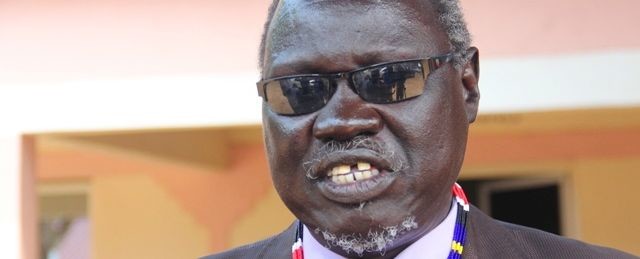The deputy chairman of the South Sudanese opposition party SPLM-DC Onyoti Adigo Nyikwec has rejected plans for elections in 2015, as proposed by President Kiir recently, saying there is a need for peace in the country before people can think of conducting an election.
“The problem is not the election – we can go for election but do we have peace now? Do we have peace in Unity State, do we have peace even here in Juba, and do people move at night in Juba?”
“This is not the right time and we think that peace must be first,” Adigo said.
In a recent cabinet sitting, the Council of Minister chaired by President Salva Kiir directed the national Minister of Finance to release funds to the elections commission to begin preparing for 2015 elections.
The commission says it is ready to conduct a national vote in 2015 if it gets the funds to do so.
According to the SPLM-DC politician, the country needs many reforms before it can consider elections. “The government of the SPLM party has failed itself by bringing war in the country and SPLM party is in chaos and putting people in war, for which they should be made accountable to the people of South Sudan for causing thousands of people to die,” he said.
He noted that there is too much insecurity, cattle raiding, land-grabbing and border disputes, and that the National Security Service needs to be reformed. Adigo said that the National Security Service is more or less an organ of one political party (SPLM-Juba).
SPLM-Juba, the faction of the SPLM controlling the cabinet, presidency and both houses of parliament, is pushing for elections next year because legally their term in office is coming to an end within ten months.
South Sudan’s constitution states in Article 100, “The tenure of the office of the President of the Republic of South Sudan shall be four years, commencing from July 9, 2011.” This means that under the current constitutional order the incumbent president will be constitutionally illegitimate after July 2015.
Besides the president, the cabinet and the entire national and state parliaments will cease to be constitutionally legitimate without an election.
For legal reasons, therefore, an election within territories controlled by SPLM-Juba would need to be held before early July 2015 at the latest. For logistical reasons, however, the actual polling would need to take place earlier, before the start of the 2015 rainy season in approximately in April.
Alternatively, the parliament could vote to amend the terms of the transitional constitution to extend their own term in office, and that of the president. To do so would require approval by two-thirds of all members of both the National Legislative Assembly and Council of States. This would allow them to remain legally in office without an election.
A third option would be for the SPLM-Juba to enter into a peace agreement with opposition groups at the peace talks in Addis Ababa. The provisions of a draft agreement with these groups made last month extended the term of the MPs and the president beyond 2015 and introduced other constitutional changes, including the creation of a prime minister position.
But such an agreement, given its constitutional implications, would itself have to be adopted by two thirds of parliament in order to enter into force.
Related:
S. Sudan electoral commission waiting on funds for 2015 vote (4 Sept.)
For breaking news updates from Radio Tamazuj ‘like’ our page on Facebook, follow us on Twitter, or subscribe to our RSS feed.



